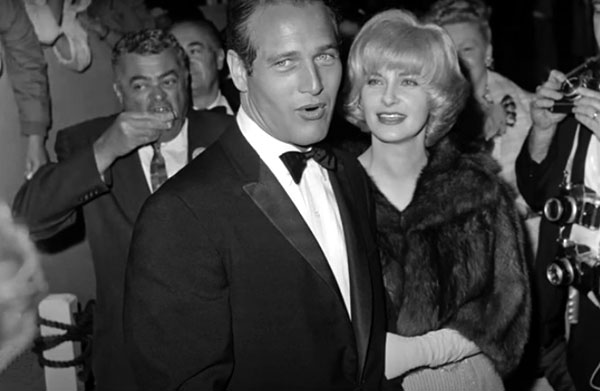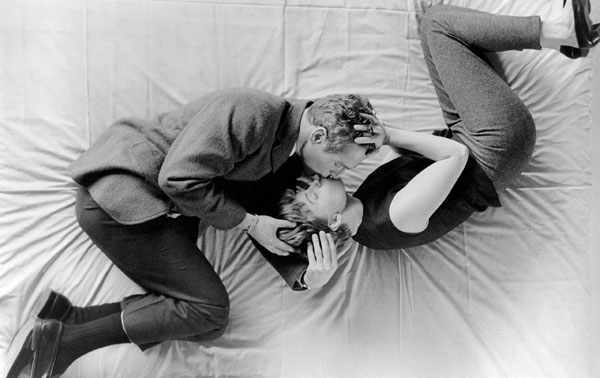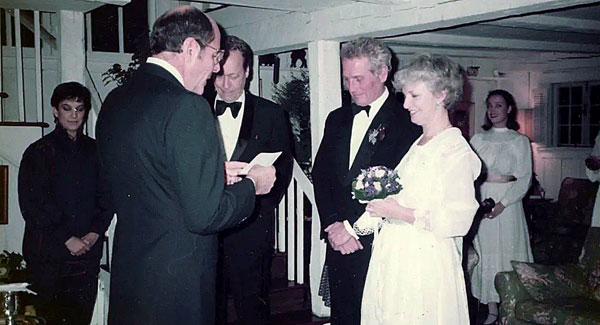|
At the beginning of The Last Movie Stars, his
new six-part
documentary on
HBO Max, Ethan
Hawke tells a
story about his
boyhood. He
and his father
were headed to
church one Sunday
when his father
suggested they go
see a matinee
instead.
The movie was Butch Cassidy and the Sundance Kid. "From
that time on," he
says, "the movies
have been my
church."
Among other
things, this
anecdote is
testimony to the
enduring appeal
of Paul
Newman.
Fourteen
years after his
death, Newman is
ubiquitous, and
seems likely to
remain so.
It isn't just a
matter of his
face being
emblazoned on
jars of spaghetti
sauce and bottles
of salad dressing
in every American
supermarket.
It isn't even
that his
perfectly
chiseled face and
ocean-blue eyes
made him one of
the handsomest
men who ever
appeared in front
of a camera.
Newman, for want
of a better
phrase, was the
Everyman who
wasn't.
There was
something about
Newman that was
fallible yet
perfect,
something that
drew us to him
and made us
believe in him
even
when—as
often
happened—he
played a total
jerk. He
always made a
charming con man,
but especially in
his later years
he radiated an
inner core of
integrity and
strength, despite
the flaws his
characters
exhibited, that
made him
unforgettable.
Tied to that
strength were a
sterling work
ethic and a
constant effort
to stretch
himself, so that
in the end his
list of credits
outshone that of
almost any male
performer of his
era.
Sixty-odd years
ago, it looked as
if Newman's wife,
Joanne Woodward,
would be the
bigger
star.
Woodward was more
naturally
talented than her
husband, and
universally
acknowledged to
be. No one
thought this more
than Newman
himself.
Woodward
established
herself
early—in
such films as The
Three Faces of
Eve, for
which she won an
Oscar at
28—as a
master. Her
range was
limitless; she
excelled at both
bravura roles and
the most delicate
gradations of
thought and
feeling.
She even
outshone Brando
in their film
together, The
Fugitive
Kind. Her
ambition and work
ethic equaled her
husband's, but
the obstacles she
faced—most
of them having to
do with being a
woman and
mother—far
exceeded
his.
Woodward's
reputation has
not
faded—far
from it—but
her greatest fame
is through her
connection with
Newman.

Given this—one partner aware of the other's greater talent, one partner aware
of the other's greater fame--how did the marriage of Paul Newman and Joanne
Woodward last fifty years? This is the main question—though not the only
one—that Hawke seeks to answer.
Hawke had abundant material to work with, over and beyond the voluminous
film and video clips you would expect. One of Newman's friends, screenwriter
Stewart Stern, interviewed Newman, Woodward, and more than a hundred of
their friends and colleagues in preparation for a memoir Newman planned to
write. For reasons which will always remain unclear, Newman burned the
tapes. But he didn't burn the transcripts Stern made, and those transcripts —
boxes and boxes of them, provided by one of Newman's daughters, who
approached him with the project--form the basis of Hawke's film.
Hawke assembled a brilliant group of actors to read the transcripts. George
Clooney takes the role of Newman, Laura Linney that of Woodward; other
participants include Sally Field, Zoe Kazan, Josh Hamilton, Bobby Cannavale,
Tom McCarthy, Billy Crudup, Vincent D'Onofrio, Mark Ruffalo, Ewan
McGregor, Oscar Isaac, Sam Rockwell, and Brooks Ashmanskas, who nearly
steals the show voicing Newman and Woodward's lifelong friend Gore Vidal.
It was Vidal who, in his interview, provided the title for this film: "I think
people will remember them as the last movie stars. They were the last people
who were treated at the beginning of their careers the way Katharine Hepburn
and Gary Cooper were treated, and they survived."
Filmed during the pandemic, The Last Movie Stars begins with Hawke and the
actors assembling via Zoom, with Newman and Woodward's children joining
later. (New York Times reviewer Mike Hale correctly likens this to a cast
showing up for a read-through.) The welter of voices over the stream of film,
videotape and newsreel footage is disorienting at first, but soon we become
engrossed in the story of how two young people—the son of an Ohio sporting
goods store owner and the daughter of an impoverished South Carolina single
mother—met each other as understudies in the 1953 Broadway production of Picnic. They married five years later and worked together in 16 movies, three
Broadway plays and dozens of TV programs.
Newman and Woodward were members of the Actors Studio during its apex,
the heady 1950s era of Brando and Kazan. Hawke and film editor Barry
Poltermann are wonderful at conveying the excitement of that milieu.
Woodward, after a brief awkward period, found a true home at the Studio. In a
videotaped interview, Sanford Meisner reminisced about asking Woodward,
"Why do you want to be an actor?" According to Meisner, she answered in a
thick Southern accent: "Because it's all I know how to do."
Newman had a tougher time. Mockingly called "Brando II," he was seen as
lacking spontaneity and depth. Ben Gazzara reportedly called Newman "a
Shaker Heights asshole." Newman's reaction was, "If Ben Gazzara said it was
fake, it was fake." Vidal, as always, had an opinion: Newman, he said, was
always "thinking, thinking, thinking, and that sometimes gets in his way."
Acting in our society is considered unmanly, Vidal said, so Newman had to show
his thought processes. Woodward did not have this problem, he added, because
all women are forced to be actresses in real life.

Meanwhile, Newman and Woodward's personal lives were reaching a critical
point. The Last Movie Stars reveals that Newman and Woodward had an
affair for five years while Newman was still married to his first wife, Jackie
McDonald. Stephanie Newman, daughter of Newman and McDonald, says her
mother was devastated by the betrayal, and remained so. McDonald herself (in
the interview transcript read by Zoe Kazan) testified to her heartbreak: she was
left alone with three children while Joanne Woodward was onstage accepting
an Oscar. A friend of Newman and McDonald summed it up: "They were two
very nice people who never should have married each other."
Nineteen fifty-eight was the year Newman and Woodward achieved both
personal and professional parity. Their marriage coincided with their first film
together—The Long, Hot Summer, an international hit. Newman won Best
Actor at Cannes for that film the same year that Woodward won her Oscar for The Three Faces of Eve. But soon Newman was traveling around the world on
location, while Woodward was stuck at home with three daughters. (In the
interview read by Linney, Woodward confessed that, although she loved her
daughters, if she had known how motherhood would affect her career, she
might not have had children.) The sexism of the time also stymied Woodward,
sometimes even at home. Newman's widely publicized remark about
marital fidelity—"Why should I go out for a hamburger when I have steak at
home?"—did not help. Woodward's reaction was, "I am not a piece of meat!"
There was the tragedy of Scott, Newman's son with McDonald. An aspiring
actor, Scott had a few roles, but what he mostly did was drugs, which killed him
at 28. Grief over Scott, along with professional pressures, exacerbated
Newman's alcoholism. Woodward threw him out; after four days of sleeping in
the driveway, Newman asked if she would take him back if he limited his
drinking to beer. She did.
Throughout The Last Movie Stars, Hawke is masterful at matching clips from
Newman and Woodward's movies with the events in their lives. He shows their
flaws, but also how they grew, not only as people and as a couple, but as artists.
Commenting on the action, Hawke says outright that Newman and Woodward
are not only the actors but the people he has always aspired to be, and the other
participants are in total agreement. These include Linney, whom Woodward
mentored, and Field, who had two of her biggest successes working with
Woodward (Sybil) and Newman (Absence of Malice). Newman and
Woodward's philanthropy alone—the Newman's Own product line, which to
date has contributed more than $550 million to charity, and the Hole in the
Wall Gang camps for children with leukemia and AIDS—is enough to add their
names to the pantheon.
The last episode, which concentrates on Newman and Woodward's later lives
and careers, is especially moving. Hawke and Richard Linklater select The
Color of Money as the most significant of Newman's late films. In Linklater's
words, Newman achieves "the emergence of his true self" as Fast Eddie Felson.
Twenty-five years after The Hustler, Fast Eddie is no longer striving; his calm
and self-confidence are palpable. Of Tom Cruise's character, Vincent Lauria,
Fast Eddie says, "He's got to learn how to be himself—with a purpose."
As for Woodward, her sense of purpose was never in doubt. She continued to
star in films, many of them either with Newman (Mr. and Mrs. Bridge) or
directed by him (Rachel, Rachel); she directed her own theater company, one
of whose productions was Our Town starring Newman as the Stage Manager;
she starred in many TV-movies, winning three Emmys. One of the Emmy
winners was Do You Remember Love, a 1985 telefilm in which she played a
woman suffering from Alzheimer's disease. At the time she explained that the
project meant a lot to her because her mother had died of Alzheimer's. In a
tragic irony, she herself was diagnosed with Alzheimer's in 2007. Nine days
later, Newman was diagnosed with terminal cancer; he died the next year.
Woodward survives, but her illness made her incapable of participating in The
Last Movie Stars.

There is much more to The Last Movie Stars, more than can be contained in
one review. But in the end we can only be in awe of the lives Paul Newman and
Joanne Woodward created for themselves, as individuals and as a couple. Their
conflicts were many, but their mutual love and respect remained intact. The
Last Movie Stars quotes from the text they wrote when they renewed their
vows: "A good marriage must be created. It is standing together facing the
world…a common search for the good and beautiful. It is not only marrying the
right partner, it is being the right partner."
Hawke leaves us with a final image from one of Newman and Woodward's
films. I will not describe it, but it is how we fans like to imagine them, and—for
those of us who believe in a life beyond this one—what we wish for them in
Heaven.
|